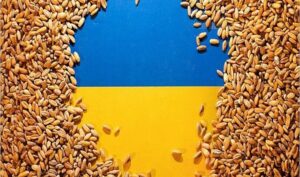
Astarta Agro-Industrial Holding, the largest sugar producer in Ukraine, exported more than 1 million tons of products to global markets in 2023, the company’s press service reported on Facebook.
According to the report, the main consumers of corn were China, Spain, Portugal, the Netherlands, and wheat – Spain, Indonesia, Portugal, and Sri Lanka.
Astarta supplied sugar, soybean oil and meal mainly to European markets, and organic products to Germany, France, Switzerland and the Czech Republic.
In the first nine months of 2023, the agro-industrial holding decreased its net profit by 9.8% to EUR 55.97 million, while revenue increased by 14.8% to EUR 392.00 million.
“Astarta is a vertically integrated agro-industrial holding company operating in eight regions of Ukraine. It comprises six sugar factories, agricultural enterprises with a land bank of 220,000 hectares and dairy farms with 22,000 cattle, an oil extraction plant in Globyno (Poltava region), seven elevators and a biogas complex. For this marketing year’s harvest, the company sowed 201 thousand hectares, which is 40% more than last year.

In January 2024, Ukraine exported 7.7 million tons of agricultural products, which is only 0.3% lower than the same indicator of the previous month. At the same time, not all the products managed to cross the border and some of the vehicles are queuing to leave, according to the Ukrainian Agribusiness Club (UCAB).
According to the UCAB, in January 2024, the structure of exports of Ukrainian agricultural products was dominated by grain crops, which were supplied to foreign markets in the amount of 5.3 million tons, which is 1% less than a month earlier. Corn accounted for 63% of supplies, wheat – 30%, barley – 6%.
Ukraine also exported 765 thsd tonnes of oilseeds, which is 1% less than in December. At the same time, supplies of rapeseed accounted for 52% of oilseed exports, soybeans – 40%, and sunflower seeds – 7%.
Vegetable oils were supplied to foreign markets in the amount of 664.5 thsd tonnes, which is 6% less than a month earlier. Sunflower oil accounted for 92% of exports, soybean oil – 5%, and rapeseed oil – 3%.)
In January 2024, Ukraine increased the export of oilcake by 20% to 591.1 thsd tonnes, of which 92% was sunflower cake and 8% was soybean cake.
In January, exports of other types of agro-industrial products decreased by 2% compared to December, with 391.6 thsd tonnes of them being supplied to foreign markets. UCAB analysts attributed the main trends in January exports to the increase in rapeseed exports compared to other oilseeds.
Usually, we managed to export the entire volume intended for this purpose before the New Year. This year, Ukraine still has a lot of exported products,” the experts explained.
The increase in exports of sunflower cake was explained by analysts by establishing exports to China through the existing sea corridor.
The export dynamics makes it possible to gradually reduce the balances of agricultural products intended for export and provide farmers with financial resources for further activities. It is very important to maintain these volumes, or even increase them. After all, not only the food security of Ukraine, but also of many countries of the world depends on the functioning of the Ukrainian agricultural sector,” UCAB summarized.

In 2023, Asket Shipping LLC increased its transshipment of agricultural products to 700 thousand tons, including 570 thousand tons in the Danube ports, the company reported on Facebook.
“The year was difficult for our industry. Attacks on the port infrastructure of Odesa region, the catastrophic consequences of the Kakhovka hydroelectric dam blowing up, and the blockade on the Polish border. All of this not only caused losses and suffering to the country, but also significantly harmed farmers and complicated the logistics chains of Ukrainian grain exports. And I am very grateful to our team, partners and customers for holding the line together and meeting the challenges of the year,” the press service quoted Kateryna Rusina, the company’s director and owner, as saying.
According to her, 700,000 tons of transshipment, of which 570,000 tons in the Danube ports, is “no less significant for the company than the millions of tons when we worked at home, in the ports of our native Azov.”
Rusina said that in 2023, Ascet Shipping began loading ships in Chornomorsk, expanded its presence in all operating ports of Ukraine, and provided customers with 50 thousand tons of storage in warehouses in Odesa and Mykolaiv.
“We have introduced new services and received a quality certificate for our management system according to the international standard ISO 9001:2015. Such high results are now possible only through triple efforts, coordinated teamwork and trust,” she added.
In addition, Ascet Shipping is preparing an appeal to international courts to obtain compensation from the seized funds of those responsible for the theft of Ukrainian grain, property and infrastructure in occupied Berdiansk and Mariupol.
“Ascet Shipping specializes in providing logistics services for the export of grain and food cargo in seven ports of Ukraine: Berdiansk, Mykolaiv, Odesa, Mariupol, Kherson, Dnipro and Zaporizhzhia. At the beginning of the war, the company moved its production facilities to western Ukraine and established cooperation with elevators in the region and Europe. The company plans to ship cargo by rail and road to European ports.
As reported, Ascet Shipping LLC transshipped 500 thousand tons of grain in 2022. The company started operations in five new ports: Odesa, Izmail, Reni, Bilhorod-Dnistrovskyi, and Kilia.
Kateryna Rusyna is the director and main beneficiary of the Asket Shipping group of companies, which includes First Fumigation Company, Asket Cargo, Azovalliance Group and others. She owns 60% of the shares. Four of her children are co-owners of the business and have 10% stakes each.

Exports of agricultural products in December 2023 should exceed 6 million tons, which became possible due to the opening of the Ukrainian shipping route, said Maksym Kharchenko, analyst at UkrAgroConsult, an information and analytical agency.
“Exports of agricultural products in December 1-15 totaled 3.38 million tons, which is 20% more than in the same period of the previous month. At the same time, the share of land exports in total exports decreased to 14.1% amid increased activity of seaports. At the same time, the role of the Danube ports in the first half of December was the lowest for the whole of 2023,” he said.
According to him, the rate of exports of agricultural products by road decreased by the end of the year due to the continuation of strikes in neighboring European countries. Currently, a queue of almost 4,000 trucks has formed to enter Ukraine from Poland. The Ministry of Infrastructure of Ukraine says that by the end of this year, Ukraine and Poland may come to a common position on blocking the borders.
“It should be noted that vegetable oils remain the main commodity transported by road for export,” UkrAgroConsult said.
Speaking about the export of agricultural products by rail, analysts noted that its pace in the first weeks of December is only slightly behind the pace of previous months. The total export volume in December is forecast at 800-900 thousand tons, which does not differ from the average for the last four months. Export flows by rail have not yet had time to reorient towards seaports.
UkrAgroConsult reported that as of December 19, 6.6 thousand railcars with grain (or about 400 thousand tons) were heading to Ukrainian seaports via domestic rail transportation, which is almost a thousand more than a week earlier.
At the same time, exports by sea through the ports of the Danube region in the first half of December amounted to only 0.56 million tons, which is far behind the same period last month.
“The Danube region is gradually losing its attractiveness for exporters due to the opening of a much cheaper option for exporting through Odesa ports,” analysts explained.
Partly due to the activity of the ports in the Danube region, in January-November, the Romanian port of Constanta shipped 32.6 million tons of grain, setting a record (the previous annual record was just over 25 million tons). Ukrainian grain amounted to 13 mln tons, or about 40% of the total transshipment volume. In 2022, the volume of transshipped agricultural products from Ukraine in the port of Constanza amounted to 8.6 million tons, UkrAgroConsult stated.

“Kernel, one of Ukraine’s largest agricultural holdings, has been using its Aeneid and Mavka vessels to export agricultural products for the second year in a row and intends to further expand its fleet, the agricultural holding reported on Facebook.
“For the second year, we have been operating our own vessels and transporting Ukrainian products in the difficult conditions of the termination of the grain deal. (…) Two Kernel vessels, Aeneid and Mavka, are currently exporting Ukrainian products. The deadweight (maximum loading) of the bulk carrier Aeneid is 47,335 tons, and the Mavka tanker is 13,500 tons. We have no plans to stop and are already working on expanding the fleet,” the statement said.
The agricultural holding noted that the use of its own fleet is economically beneficial, especially during the period of inflated freight rates during martial law. The development of its own shipping gives impetus to the entire market and strengthens the country’s export capabilities, Kernel believes.
“The Black Sea remains the only alternative for Ukrainian exports. The deep-water ports are able to accumulate and ship large-tonnage consignments of more than 60 thousand tons. This makes it possible to optimize logistics processes and significantly reduce costs. All alternative routes have extremely high logistics costs,” the agricultural holding explained and promised to continue to strengthen Ukraine’s exports and contribute to food stability in Europe and the world.
As reported, before the war, Kernel was the world’s largest producer of sunflower oil (about 7% of global production) and its exports (about 12%). It is one of the largest producers and sellers of bottled oil in Ukraine. In addition, it is engaged in the cultivation and sale of agricultural products.
In the first quarter of FY2024, the company posted a net loss of $30.9 million, while the previous year ended with a net profit of $162 million, with a 17% decrease in revenue to $564 million.
According to the report, the book value per share for the year decreased from $20.7 to $6 (or PLN26.22), in particular due to an increase in the number of shares from 77.429 million to 147.864 million.